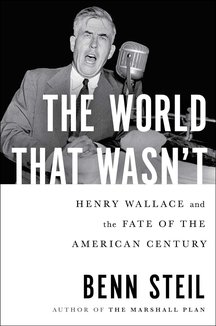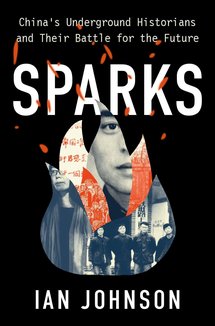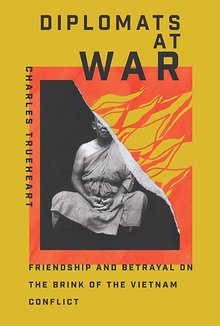Recommended Books

The World That Wasn't: Henry Wallace and the Fate of the American Century
Author:
Benn Steil
ISBN 13:
978-1982127824
From the acclaimed economist-historian and author of The Marshall Plan , a “timely, riveting” ( The Washington Post ) new perspective on the political career of Henry Wallace—one that will forever change how we view the making of US and Soviet foreign policy at the dawn of the Cold War. Henry Wallace is the most important, and certainly the most fascinating, almost-president in American history. As FDR’s third-term vice president, and a hero to many progressives, he lost his place on the 1944 Democratic ticket in a wild open convention, resulting in Harry Truman becoming president upon FDR’s death. Books, films, and even plays have since portrayed the circumstances surrounding Wallace’s defeat as corrupt, and the results catastrophic. Filmmaker Oliver Stone, among others, has claimed that Wallace’s loss ushered in four decades of devastating and unnecessary Cold War. Now, based on striking new finds from Russian, FBI, and other archives, Benn Steil’s The World That Wasn’t paints a decidedly less heroic portrait of the man, of the events surrounding his fall, and of the world that might have been under his presidency. Though a brilliant geneticist, Henry Wallace was a self-obsessed political figure, blind to the manipulations of aides—many of whom were Soviet agents and assets. From 1933 to 1949, Wallace undertook a series of remarkable interventions abroad, each aimed at remaking the world order according to his evolving spiritual blueprint. As agriculture secretary, he fell under the spell of Russian mystics, and used the cover of a plant-gathering mission to aid their doomed effort to forge a new theocratic state in Central Asia. As vice president, he toured a Potemkin Siberian continent, guided by undercover Soviet security and intelligence officials who hid labor camps and concealed prisoners. He then wrote a book, together with an American NKGB journalist source, hailing the region’s renaissance under Bolshevik leadership. In China, the Soviets uncovered his private efforts to coax concessions to Moscow from Chiang Kai-shek, fueling their ambitions to dominate Manchuria. Running for president in 1948, he colluded with Stalin to undermine his government’s foreign policy, allowing the dictator to edit his most important election speech. It was not until 1950 that he began to acknowledge his misapprehensions regarding the Kremlin’s aims and conduct. Meticulously researched and deftly written, The World That Wasn’t is a spellbinding work that shows how “American history—and world history—could have turned out very differently if just a few things had gone the other way” ( The Wall Street Journal ).

Sparks: China's Underground Historians and their Battle for the Future
Author:
Ian Johnson
ISBN 13:
978-0197575505
Using history to challenge Communist Party rule. Sparks: China's Underground Historians and their Battle for the Future describes how some of China's best-known writers, filmmakers, and artists have overcome crackdowns and censorship to forge a nationwide movement that challenges the Communist Party on its most hallowed ground: its control of history. The past is a battleground in many countries, but in China it is crucial to political power. In traditional China, dynasties rewrote history to justify their rule by proving that their predecessors were unworthy of holding power. Marxism gave this a modern gloss, describing history as an unstoppable force heading toward Communism's triumph. The Chinese Communist Party builds on these ideas to whitewash its misdeeds and glorify its rule. Indeed, one of Xi Jinping's signature policies is the control of history, which he equates with the party's survival. But in recent years, a network of independent writers, artists, and filmmakers have begun challenging this state-led disremembering. Using digital technologies to bypass China's legendary surveillance state, their samizdat journals, guerilla media posts, and underground films document a regular pattern of disasters: from famines and purges of years past to ethnic clashes and virus outbreaks of the present--powerful and inspiring accounts that have underpinned recent protests in China against Xi Jinping's strongman rule. Based on years of first-hand research in Xi Jinping's China, Sparks challenges stereotypes of a China where the state has quashed all free thought, revealing instead a country engaged in one of humanity's great struggles of memory against forgetting―a battle that will shape the China that emerges in the mid-21st century.

Diplomats at War: Friendship and Betrayal on the Brink of the Vietnam Conflict (Miller Center Studies on the Presidency)
Author:
Charles Trueheart
ISBN 13:
978-0813951287
For two Americans in Saigon in 1963, the personal and the political combine to spark the drama of a lifetime Before it spread into a tragic war that defined a generation, the conflict in Vietnam smoldered as a guerrilla insurgency and a diplomatic nightmare. Into this volatile country stepped Frederick “Fritz” Nolting, the US ambassador, and his second-in-command, William “Bill” Trueheart, immortalized in David Halberstam’s landmark work The Best and the Brightest and accidental players in a pivotal juncture in modern US history. Diplomats at War is a personal memoir by former Washington Post reporter Charles Trueheart—Bill’s son and Nolting’s godson—who grew up amid the events that traumatized two families and an entire nation. The book embeds the reader at the US embassy and dissects the fateful rift between Nolting and Trueheart over their divergent assessments of the South Vietnamese regime under Ngo Dinh Diem, who would ultimately be assassinated in a coup backed by the United States. Charles Trueheart retells the story of the United States’ headlong plunge into war from an entirely new vantage point—that of a son piecing together how his father and godfather participated in, and were deeply damaged by, this historic flashpoint. Their critical rupture, which also destroyed their close friendship, served as a dramatic preface to the United States’ disastrous involvement in the Vietnam conflict.